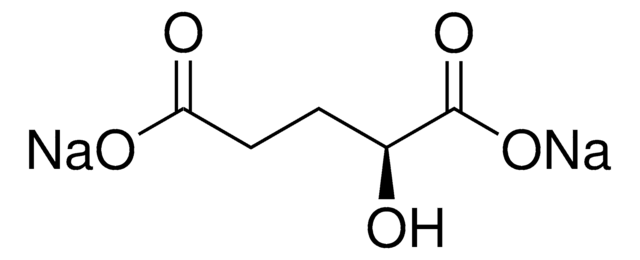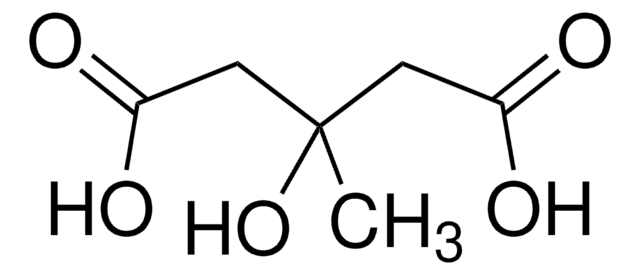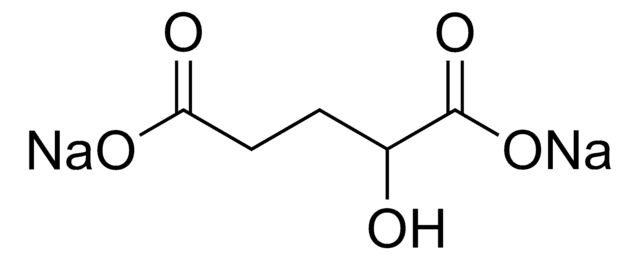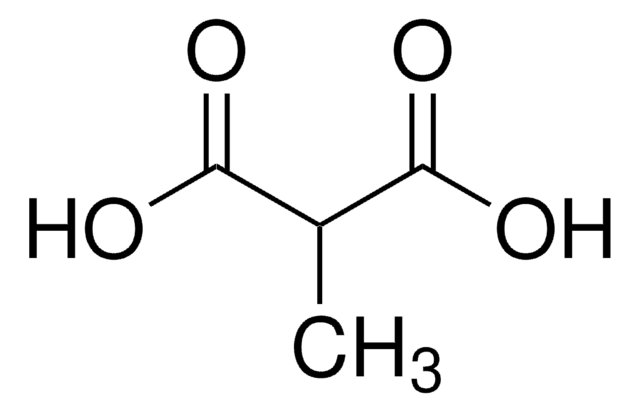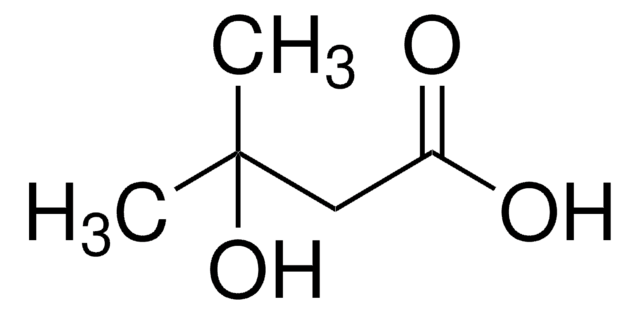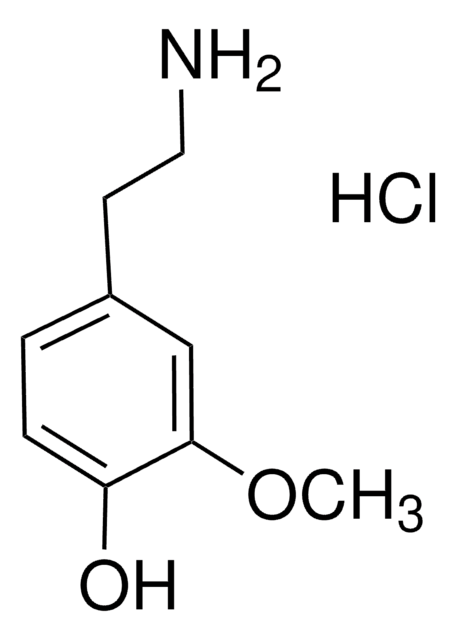Wszystkie zdjęcia(1)
Key Documents
04725
3-Hydroxyglutaric acid
analytical standard
Synonim(y):
β-Hydroxyglutaric acid, 3-Hydroxypentanedioic acid
Zaloguj sięWyświetlanie cen organizacyjnych i kontraktowych
About This Item
Wzór empiryczny (zapis Hilla):
C5H8O5
Numer CAS:
Masa cząsteczkowa:
148.11
Beilstein:
1705476
Numer MDL:
Kod UNSPSC:
12352106
Identyfikator substancji w PubChem:
NACRES:
NA.24
Polecane produkty
klasa czystości
analytical standard
Poziom jakości
Próba
≥95.0% (GC)
okres trwałości
limited shelf life, expiry date on the label
Zastosowanie
clinical testing
format
neat
temp. przechowywania
2-8°C
InChI
1S/C5H8O5/c6-3(1-4(7)8)2-5(9)10/h3,6H,1-2H2,(H,7,8)(H,9,10)
Klucz InChI
ZQHYXNSQOIDNTL-UHFFFAOYSA-N
Szukasz podobnych produktów? Odwiedź Przewodnik dotyczący porównywania produktów
Działania biochem./fizjol.
3-Hydroxyglutaric acid is a glutaric acid derivative which is the byproduct of glutaric acidemia type I. Glutaric aciduria type I (glutaryl-CoA dehydrogenase deficiency) is an inborn error of metabolism that usually manifests in infancy by an acute encephalopathic crisis and often results in permanent motor handicap. Studies indicate that 3-hydroxyglutaric acid can be used as biomarker for GCDH (glutaryl-CoA dehydrogenase) deficiency. It is believed that the excretion of 3-hydroxyglutaric acid is increased during ketosis, which occurs during glutaryl-CoA dehydrogenase deficiency. Studies on striatal cultures show that IGF-1 and FGF-2 (bFGF) reduces 3-hydroxyglutaric acid toxicity in striatal neurons.
Polecane produkty
Find a digital Reference Material for this product available on our online platform ChemisTwin® for NMR. You can use this digital equivalent on ChemisTwin® for your sample identity confirmation and compound quantification (with digital external standard). An NMR spectrum of this substance can be viewed and an online comparison against your sample can be performed with a few mouseclicks. Learn more here and start your free trial.
This page may contain text that has been machine translated.
Kod klasy składowania
11 - Combustible Solids
Klasa zagrożenia wodnego (WGK)
WGK 3
Wybierz jedną z najnowszych wersji:
Masz już ten produkt?
Dokumenty związane z niedawno zakupionymi produktami zostały zamieszczone w Bibliotece dokumentów.
K B Bjugstad et al.
Journal of inherited metabolic disease, 24(6), 631-647 (2002-01-05)
Glutaric acid (GA) and 3-hydroxyglutaric acid (3GA) are thought to contribute to the degeneration of the caudate and putamen that is seen in some children with glutaric acidaemia type I, a metabolic disorder caused by a glutaryl-CoA dehydrogenase deficiency. This
Garfield A Simon et al.
Journal of chromatography. B, Analytical technologies in the biomedical and life sciences, 1097-1098, 101-110 (2018-09-16)
Glutaric aciduria type 1, a deficiency of glutaryl-CoA dehydrogenase, causes an accumulation of neurotoxic metabolites glutaric acid and 3-hydroxyglutaric acid (3-HGA). Testing of these analytes is routinely done by GC-MS but seldom account for interference from isomers or compounds with
Paris Jafari et al.
PloS one, 8(1), e53735-e53735 (2013-01-18)
Glutaric aciduria type I (glutaryl-CoA dehydrogenase deficiency) is an inborn error of metabolism that usually manifests in infancy by an acute encephalopathic crisis and often results in permanent motor handicap. Biochemical hallmarks of this disease are elevated levels of glutarate
Gustavo C Ferreira et al.
International journal of developmental neuroscience : the official journal of the International Society for Developmental Neuroscience, 25(6), 391-398 (2007-07-24)
Glutaric acidemia type I is an inherited metabolic disorder caused by a severe deficiency of the mitochondrial glutaryl-CoA dehydrogenase activity leading to accumulation of predominantly glutaric and 3-hydroxyglutaric acids in the brain tissue of the affected patients. Considering that a
J Pitt et al.
Journal of inherited metabolic disease, 25(2), 83-88 (2002-07-18)
Three patients with ketosis had increased excretion of 3-hydroxyglutarate (21.8-37.9 micromol/mmol creatinine; controls 2.3 +/- 1.6), an indicator of glutaryl-CoA dehydrogenase deficiency (GDHD), which normalized when the patients were nonketotic. Clinical assessment of all three patients and enzyme studies in
Nasz zespół naukowców ma doświadczenie we wszystkich obszarach badań, w tym w naukach przyrodniczych, materiałoznawstwie, syntezie chemicznej, chromatografii, analityce i wielu innych dziedzinach.
Skontaktuj się z zespołem ds. pomocy technicznej